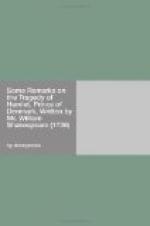But to return to Page 228.
Bernardo, How now Horatio!
you tremble
and look pale, &c.
This is entirely in Nature, for it cannot be supposed, that any Man, tho’ never so much endu’d with Fortitude, could see so strange a Sight, so shocking to human Nature, without some Commotion of his Frame, although the Bravery of his Mind makes him get the better of it.
Page 228.
Horatio, Before my God, I might
not this believe,
Without the sensible and trite Avouch
Of mine own Eyes.
This Speech still helps on our Deception, for the Reasons I have already given.
Page 228.
Horatio, Such was the very Armour
he
had on, &c.
I have heard many Persons wonder why the Poet should bring in this Ghost in complete Armour. It does, I own, at first seem hard to be accounted for; but I think these Reasons may be given for it, viz. We are to consider, that he could introduce him in these Dresses only; in his Regal Dress, in a Habit of Interment, in a common Habit, or in some Phantastick one of his own Invention. Now let us examine which was most likely to affect the Spectators with Passions proper to the Occasion, and which could most probably furnish out great Sentiments and fine Expressions.
The Regal Habit has nothing uncommon in it, nor surprising; nor could it give rise to any fine Images. The Habit of Interment was something too horrible; for Terror, not Horror, is to be raised in the Spectators. The common Habit (or Habit de Ville, as the French call it) was by no Means proper for the Occasion.
It remains then, that the Poet should chuse some Habit from his own Brain: But this certainly could not be proper, because Invention in such a Case, would be so much in Danger of falling into the Grotesque, that it was not to be hazarded.
Now as to the Armour, it was very suitable to a King, who is described as a great Warrior, and is very particular, and consequently affects the Spectators, without being phantastick. Besides, if there were no other Reason, the fine Image which arises from thence, in these Lines, is Reason enough.
Such was the very
Armour he had on,
When He th’ ambitious
Norway combated,
So frown’d He once, when in
angry Parle,
He smote the sleaded Polack
on the Ice.
’Tis Strange!
There is a Stroke of Nature in Horatio’s breaking off, from the Description of the King, and falling into the Exclamation. ’Tis Strange! which is inimitably Beautiful.
Page 228.
Marcellus. Good now sit down, &c.




